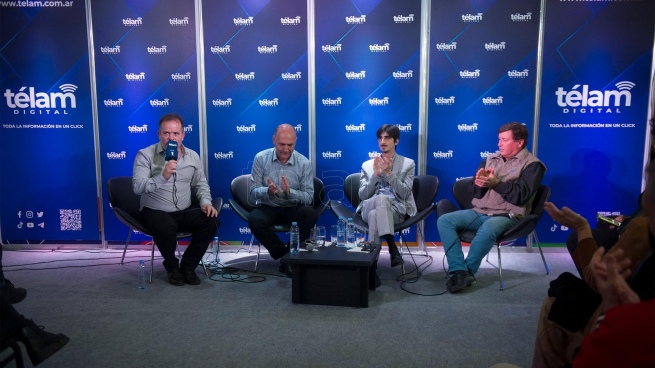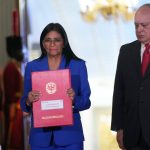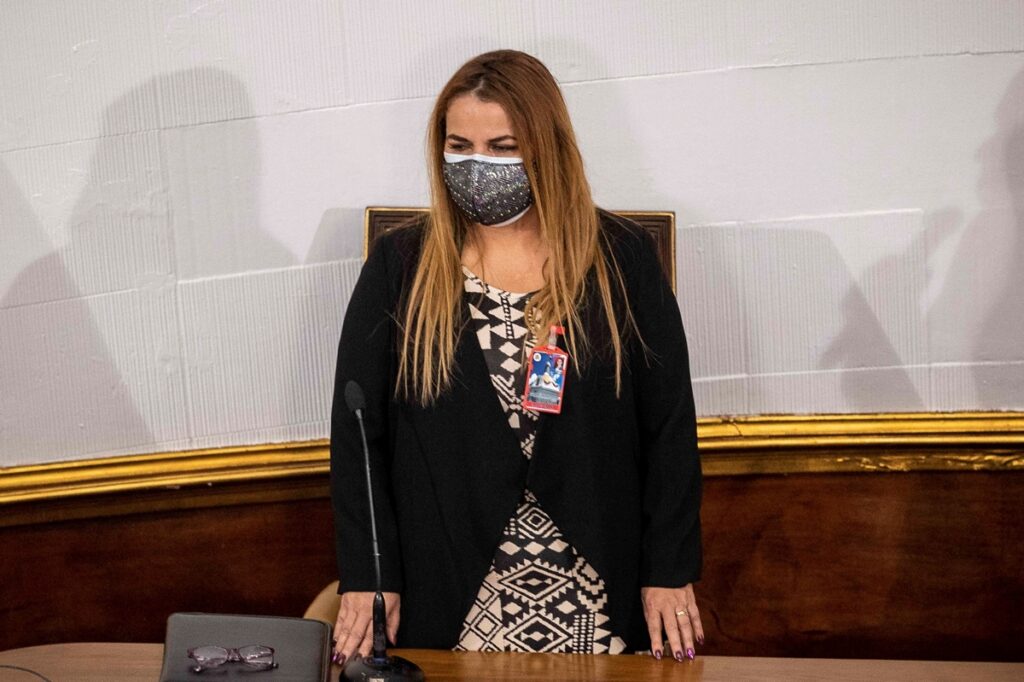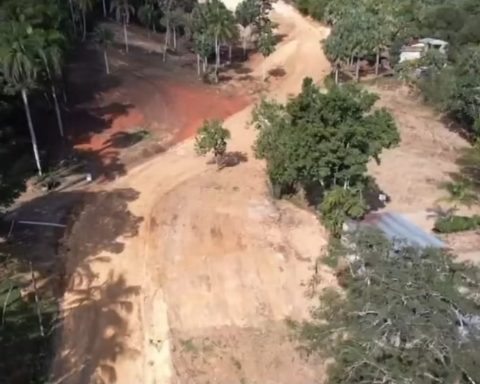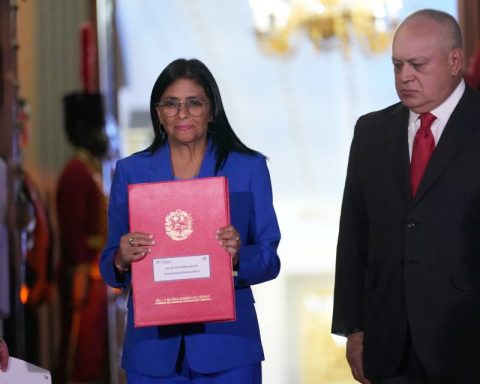The Secretary for Matters Related to Malvinas, Antarctica and the South Atlantic, Guillermo Carmona; the geopolitical analyst Francisco Taiana and the survivor of the sinking of the ARA General BelgranoJorge Massin, participated in a talk on international law in relation to the Malvinas issue, and agreed on the need to “denounce the strong process of militarization” that Great Britain has imposed since the 1980s in the South Atlantic.
It was an activity organized by Télam at the 46th Buenos Aires International Book Fair in the framework of the 40th anniversary of the Malvinas War, in which the fallen of the attack suffered by the cruiser ARA General Belgrano in the middle of the war of 1982 were rememberedand issues such as the recent revelations about the transport of nuclear weapons carried out by Great Britain during the war were analyzed.
? Télam Space at the Book Fair (@fairbook)
? Francisco Taiana, historian: “Our generation is quite challenged by Malvinas, it remains a very central issue”
? I followed the talk about Falklands live by https://t.co/A53abGxw40 pic.twitter.com/UvXZkUq0AW
—Telam Agency (@TelamAgency) May 6, 2022
“We must make the Malvinas issue visible from a comprehensive perspective that includes the strong process of militarization of the South Atlantic, something that has worsened year after year since the 1980s. We are talking about one of the most militarized territories in the world,” Carmona said. at the beginning of your presentation.
In this sense, the official explained that “with a civilian population of around 3,200 inhabitants (in Malvinas), there is a staff of 1,500 soldiers,” adding that it is “the presence of a military human resource with a complex technological system weaponry and missile of the latest generation”.
“This presence not only violates international treaties but is also a provocation to the decision of the Latin American countries to demilitarize the region,” the official asserted.

He also reported that “we have promoted a meeting in June with South American and African countries to work on cooperation and articulation actions that generate protection mechanisms for the South Atlantic area.”
“Novelties and elements continue to emerge. In this sense, we have to remember the recent declassification of British files that gave details about the enormous scope of the nuclear weapons present during the war. This is something that allows us to reassess the war conflict,” the secretary warned.
In this way, Carmona made reference to the information that emerged from the declassification of British government files that revealed the presence of 31 nuclear weapons on board the fleet that the United Kingdom sent to the Falklands War.
“We must make the Malvinas issue visible from a comprehensive perspective that includes the strong process of militarization of the South Atlantic, something that has worsened year after year since the 1980s. We are talking about one of the most militarized territories in the world”William Carmona
Those atomic supplies were traveling on the British aircraft carrier HMS Hermes, which had 18 nuclear weapons on board; the aircraft carrier Invincible (12) and the auxiliary ship of the Regent Royal Fleet that had one.
“We will continue to claim, as we did at the UN, in Geneva, against the opacity and lack of good faith on the part of the United Kingdom, which is reluctant to provide details and accurate information on the inclusion of nuclear weapons in the South Atlantic during the war. Malvinas. This is something that violates the Treaty of Tlatelolco on Nuclear Non-Proliferation,” the official assured.
? Télam Space at the Book Fair (@fairbook)
? Jorge Massin, survivor of the ARA General Belgrano: “We had 36 hours of shipwreck, with a very strong storm, temperature below zero”
? I followed the talk about Falklands live by https://t.co/A53abGxw40 pic.twitter.com/0w1kQZBlb1
—Telam Agency (@TelamAgency) May 6, 2022
In this regard, another of the speakers at the meeting, the historian TaianaI affirm that the declassification of these files showed the magnitude of the decision to send nuclear weapons to the Malvinas war, in the analysis of the pros and cons made by the British government to do so, given that “65% of the entire British arsenal of that type of nuclear weapons was concentrated in those few boats”.

“It was daring on the part of the British government to make this decision whose implications could have been catastrophic,” Taiana told Télam.who considered that “the concern about the intervention of the Soviet Union, which gives scale to the possible ramifications of the conflict, shows another background to be analyzed”.
In this sense, the historian remarked that “the cold war never ceased to be a global conflict and the actors involved always thought of it in that dimension.”
“I find the significance of the Malvinas conflict revealing, that we tend to always see it from our most local prism, but it really was a key event on the international scene,” said Taiana.
Regarding the secrecy that the British Government maintains to this day in the face of the Argentine claim for explanations and details about the presence of nuclear weapons in Malvinas, the historian explained that the main argument to which they have historically adhered is “their policy of neither confirming nor denying the presence of their nuclear weapons at any time anywhere.
Days after the 40th anniversary of the sinking of the ARA General Belgranoattack perpetrated by the British submarine Conqueror on May 2, 1982, which caused the death of 323 Argentine sailors, the concurrence listened to the story of the santafesino Jorge Massinone of the 770 survivors of that attack.
At the time of the first impact Massin he had just come out of his break to take watch, the first fact that saved his life, since the first torpedo hit the engine area, just below the orlop where he and his companions slept.
“On the way, going to take the guard, the first explosion occurred. It was so strong that our legs were bending from the pressure,” said the sailor from Santa Fe, who assured that thanks to the instruction received, they knew “every staircase and nook and cranny of the ship by heart and they knew what they had to do”, which saved the lives of 770 crew members.
? Télam Space at the Book Fair (@fairbook)
?Guillermo Carmona (@grcarmonac): “From the national government we recognize those who fell in Belgrano and the heroic actions of those who survived”
? I followed the talk about Falklands live by https://t.co/A53abGxw40 pic.twitter.com/YYkt5ACi45
—Telam Agency (@TelamAgency) May 6, 2022
For Massin, who was doing military service at the time of the events, he said that going through the subsequent 36 hours of waiting to be rescued represented “the longest night of his life.”
“The great odyssey of surviving began. Going from a warm, comfortable ship to a small inflatable raft that was like a shell in the middle of the ocean with temperatures of 20 degrees below zero, winds of 100 kilometers per hour and huge waves,” he said. Massin.
The man from Santa Fe recalled how they fought during those 36 hours “to prevent the force of the waves from turning the raft over, because we knew that if we fell into the water, due to its temperature, only three minutes separated us from life and death.”

Finally, in the early hours of Tuesday, May 4, Massin and his companions on the raft, -among whom was Captain Héctor Bonzo, who died fifteen years ago as a result of a heart attack- were rescued by the ship Bouchard.
“The adrenaline did not allow us to become aware of the risk. I became aware when I returned and they gave us a week to see our families. I saw my old pale, white woman and there she told me ‘now I can believe that you are alive’, it was very hard”, recalled the “cannoneer” of turret 1 of the ARA General Belgrano.
When asked why he never visited the Malvinas, Massin said: “I don’t want to arrive in the Malvinas with a passport, it is very difficult to have to go and get that document to go and set foot on your soil.”
“I would like to go to Malvinas as an Argentine and not as a foreigner,” he said.
